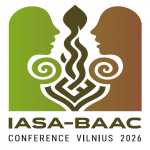Code of Ethics
IASA CODE OF ETHICS
IASA is committed to the values of openness, integrity, and accountability. This Code of Ethics reflects our commitment to sound and ethical business practices in accordance with the IASA Constitution.
The purpose of the Code is to provide the IASA Executive Board and all Officers of IASA Committees and Sections (hereafter all Board members and other officers are referred to as “IASA Officers”) with a clear set of guiding principles.
It is established IASA practice to conduct all its business dealings on the basis of respect for the law, for each other without any prejudice or discrimination, and with good regard for ethical business practices.
In our dealings with customers, suppliers, and business associates, we strive to prevent any situation that may compromise these principles.
GUIDING PRINCIPLES
All IASA Officers have an obligation to:
- comply strictly with all applicable laws and regulations wherever IASA does business
- treat clients, members, colleagues, competitors, and third parties with dignity, integrity, and respect
- communicate courteously
- take care to be helpful, fair, and open
- observe a high standard of ethics in all business activities
USE AND MANAGEMENT OF IASA ASSETS
The funds and assets of IASA are to be used only for lawful and authorised IASA purposes.
All transactions are to be reflected properly and accurately in the accounting and administrative records of IASA.
IASA Officers shall not abuse any role in which they are required to deal with funds of the company.
CONFLICT OF INTEREST 1
Generally, IASA Officers shall act primarily in the best interests of IASA.
This means that IASA Officers may not engage in any activity or have a personal interest that could constitute a conflict of interest. Such a conflict of interest could arise when an IASA Officer has an interest or is involved in any activity or relationship that might influence his/her judgment, honesty, and objectivity in a way that conflicts with the interests of IASA.
IASA Officers have an obligation to avoid situations involving not only an actual conflict of interest, but also situations that could be perceived as a conflict between personal interest and the interests of IASA.
IASA Officers shall not request or accept personal favours or preferential treatment when these are offered by virtue of their positions as IASA Officers. Such requests or acceptance of offers may place an obligation on the IASA Officer in question.
IASA Officers shall remain free from any influence, interests, or relationships that could impair their objectivity or impartiality.
BRIBES, COMMISSIONS, HONORARIUMS, GIFTS, AND ENTERTAINMENT
The acceptance of gifts or hospitality by IASA Officers, when such acceptance may be perceived as influencing their judgment, honesty, and objectivity in a way that conflicts with the interests of IASA, could also constitute a conflict of interest.
IASA does not permit or condone bribes, kickbacks, secret profits, improper commissions, or any other illegal, secret, or improper payments, transfers, or receipts. IASA Officers may not accept improper payments of such a nature or any other corrupt or questionable benefits or potential goods or services. Improper favouritism or influencing (or even only the appearance or perception thereof) is not permitted regardless of the value it might bring.
IASA Officers are entitled to receive goodwill gifts intended as expressing thanks or promoting good professional relationships in order to improve service levels, provided the gifts are disclosed to the IASA Board and minuted accordingly.
CONFIDENTIALITY
IASA Executive Board members, while serving on the IASA Executive Board and thereafter, are bound to maintain confidentiality and not to disclose any of IASA’s confidential documentation or information, membership lists, and/or financial information to any person other than those specifically authorised by IASA to access such information for the purpose of their association with IASA.
1. The IASA Constitution includes the following:
39. If a proposed decision of the Executive Board is concerned with an actual or proposed transaction or arrangement with an organisation or situation in which a Board Member is interested, that Board Member is to declare the conflict and participation in any following discussion will be determined by majority vote of Board Members present.
40. If a question arises at a meeting of the Executive Board or of a committee of Board Members as to the right of a Board member to participate in the meeting (or part of the meeting) for voting or quorum purposes, the question may, before the conclusion of the meeting, be referred to the chair whose ruling in relation to any Board Member other than the chair is to be final and conclusive.
41. If any question as to the right to participate in the meeting (or part of the meeting) should arise in respect of the President, the question is to be decided by a decision of the Board Members at that meeting, for which purpose the President is not to be counted as participating in the meeting (or that part of the meeting) for voting or quorum purposes.


